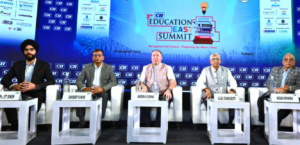Sustainable and inclusive education is essential for enhancing the future well-being of both communities and nations. For the same, judging our parameters should be of utmost important, where Government, Society, education institutions and industry must work in absolute tandem. Industry must come forward to give better linkage for better academia to the students, said Dr Mamta Rani Agarwal, Additional Secretary, AIU, former Adviser, AICTE and former Joint Secretary, UGC, at the 3rd Education East Summit, organised by CII Eastern Region, in Kolkata, today. She further stated that the future of education, characterized by skillset training, is vital for aligning with upcoming job requirements, effectively integrating both logical and creative thinking to enhance skills. A recent survey by McKinsey revealed a shift in industry hiring trends, with 85% of managers focusing on candidates’ skillsets rather than their educational degrees when recruiting for freelance roles.
Furthermore, Dr Agarwal pointed out that World Economic Forum Report indicates that by 2027, 75 million repetitive and manual jobs are expected to disappear, while 122 million new positions requiring different skill sets will emerge. She emphasized that the Indian education system has implemented policies aimed at incorporating the Indian Knowledge System, fostering a generation of highly competitive professionals, and offering multilingual education to overcome regional limitations.
Mr Andrew Alexander Fleming, Deputy High Commissioner, British Deputy High Commission highlighted that during the academic year 2021-22, a total of 126,535 Indian students enrolled in the UK, making it the second most popular destination after the US. Furthermore, in the previous year, the UK issued 142,848 student visas to Indian nationals, indicating a substantial increase in these figures. India has surpassed China in sending students to the UK. Currently, the National Education Policy (NEP) 2020 has proven to be transformative for India’s education landscape. This policy aims to internationalize the education system in India, thereby attracting more international students. It is also essential for students from Western countries to consider India for their higher education pursuits.
Prof. Saibal Chattopadhyay, Director-in-Charge, IIM Calcutta, underscored the importance of the future of education, stating that technology offers significant advantages. Although Artificial Intelligence and Machine Learning are currently in use, they are updated every two years, necessitating their integration into the education system. To ensure students acquire the most current skills, it is essential for experienced individuals from the industry to engage in their training.

Mr Ujjal Chakrabarti, Chairman, CII ER Education & Skill Development Sub-Committee & Executive In-Charge – Tinplate Division, Tata Steel Limited, indicated that India has experienced notable progress in its education system. He underscored the necessity for the education system to prioritize the development of new job creators, with multidisciplinary education being a vital component.
Mr Madan Mohanka, Mentor of CII Eastern Region Education Subcommittee & Executive Chairman, Tega Industries Ltd, pointed out that the effective implementation of APAAR ID for students brings a variety of benefits. He mentioned that education should be democratized in a global classroom environment. The role of human connections and understanding will be just as essential as any form of technical creativity.
Mr Sandeep Kumar, Chairman, CII West Bengal State Council & Managing Director, Tata Steel Downstream Products Ltd, outlined that 100-crore population in India will reach by 2050, where every 4th worker from the global workforce will come from India. Investing in new entrepreneur workforce must be implemented through collaboration of Industry and academia, to prepare students for new skillsets.